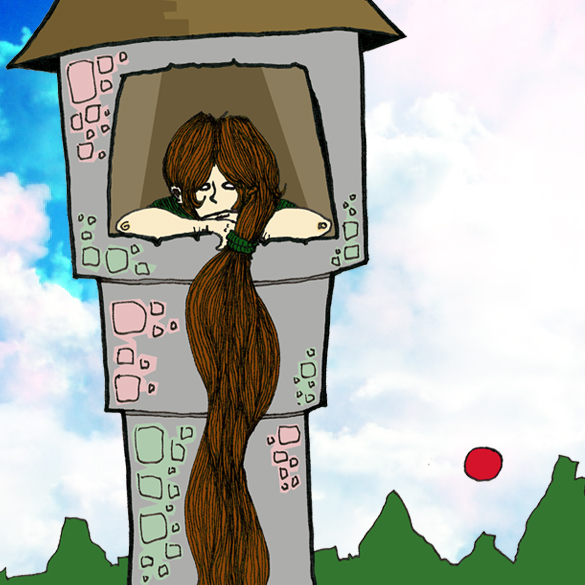There’s little that can compare to a summer afternoon on a shady back porch—seventy-seven degrees, with a large, chilled beverage and a good book of poetry in hand. With the recent bout of gorgeous weather here in Charlottesville, I soon found myself perusing the shelves of my local bookstore. I’d just finished reading a ton of modernist poetry—Yeats and Eliot and whatnot, so I was looking for something a little more contemporary, maybe, post sixties but not last-twenty-years contemporary. I picked a book by Anne Sexton off the shelf, first off because I wanted to read a female poet after those modernists, and because a close friend had recommended her. Upon opening Transformations, I found the publication date— 1971. Score. And so I read.
The first thing that strikes you about the edition of Transformations that I picked up is the foreword by Kurt Vonnegut. Not only did his irreverence make me chuckle, but he makes some enlightening statements about poetry as well. Poets “extend language,” he says. “Anne Sexton does a deeper favor for me: she domesticates my terror, examines it, and describes it, teaches it some tricks which will amuse me, then lets it gallop wild in my forest once more.” I love how Vonnegut juxtaposes domesticity and terror with his typical charm. “How do I explain these poems, Not at all. I quit teaching in colleges because it seemed so criminal to explain works of art.” We don’t need to explain or over-think poetry, as it is fundamentally about how it makes the reader feel. You know when a poem is good because you know, not because someone said so. However, despite his advice, I’m going to try and give what little insight I’ve gleaned about Sexton, from reading Transformations.
Sexton only began writing poetry as advice from a counselor. She was battling mental illness, and wrote poetry as an outlet. Clearly though, Sexton’s poetry wasn’t merely therapeutic. After some encouragement from friends, she began compiling and publishing her poems, and by 1967 she earned a Pulitzer. However, I was shocked to discover that Sexton lost her battle with mental illness in 1974, committing suicide at age 45. I honestly couldn’t believe it, based on the poems I read. From then on I read the poetry a little differently, with a bit of inescapable heaviness.
The first few poems immediately hook you, and I, in fact, finished the book on one sitting. Transformations is Anne Sexton’s retelling of various Grimm Fairytales. She starts, and continues an interesting pattern in which each poem is split two ways, an indented sort of preface, and then her retelling of the story. You’ll notice the transition into storytelling mode after the indented section, from “The Twelve Dancing Princess’s”:
The night nurse
with her eyes slit like Venetian blinds,
she of the tubes and the plasma,
listening to the heart monitor,
the death cricket bleeping,
she who calls you “we”
and keeps vigil like a ballistic missile,
would understand.
Once
This king had twelve daughters,
Each more beautiful than the other.
They slept together, bed by bed
In a kind of girls’ dormitory…”
The preface always has something to do with the story, even if it is in a completely different voice. If you already don’t know, this story involves twelve princesses who secretly go out dancing all night. Sexton’s preface offers images of different people who might understand “if you danced from midnight until six A.M.,” including a “runaway boy,” “paralytics wife,” and the “night nurse,” mentioned above. The juxtaposition of imagined princesses locked up in a room though they want to dance the night away and a paralyzed wife who takes her husband to a bar in order to watch other couples dance feels somewhat stretched, though clever. We see these kinds of connections in all her prefaces.
Another captivating element to Sexton’s poetry is her form and style. Aside from her dual-poem patter throughout the book, her poetry can be examined on a line level as well. One thing that Sexton does, and does well is metaphors. Her poems are heavily populated by simile and metaphor, which, might come off as overbearing, but her descriptors don’t. Not only do they easily measure up in quantity, but in quality as well. Every metaphor was either blissfully simple or fresh, and all were uncannily appropriate. To wit:
One with one eye
like a great blue aggie
One with two eyes,
common as pennies.
One with three eyes,
the third like an intern.
I love the simplicity of her comparing a sole eye to a giant blue gem. Again, something rare which is why the mother favored the first daughter over the second, who had eyes as common as pennies you find on the street.
Throughout Transformations, Sexton uses form in interesting ways. “Rapunzel,” for instance, is almost melodic, and form appropriately mirrors content here, as Rapunzel sits in her tower alone all day, singing. The following lines exemplify how Sexton’s story-telling section of the poem is still somewhat prosaic in its syntax and line integrity, but musical in its meter and flow, especially when repeated.
Rapunzel, Rapunzel, let down your hair,
and thus they met and he declared his love.
What is this beast, she thought,
with muscles on his arms
like a bag of snakes?
What is this moss on his legs?
What prickly plant grows on his cheeks?
What is this voice as deep as a dog?
Yet he dazzled her with his answers.
Yet he dazzled her with his dancing stick.
They lay together upon the yellowy threads,
swimming through them
like minnows through kelp
and they sang out benedictions like the Pope.
This section sings almost like a song when read out loud. It’s as if Sexton is trying to lure in the reader as Rapunzel did her Prince.
We’ve read retellings before, and they either flop completely or add something new by giving the author a chance to add their perspective on something that’s established. Transformations hits home because it laces fairy tales with Sexton’s adept poetic skills, making it into a wonderfully nostalgic yet insightful read—a version of Grimm for adults, with a Sexton twist.



